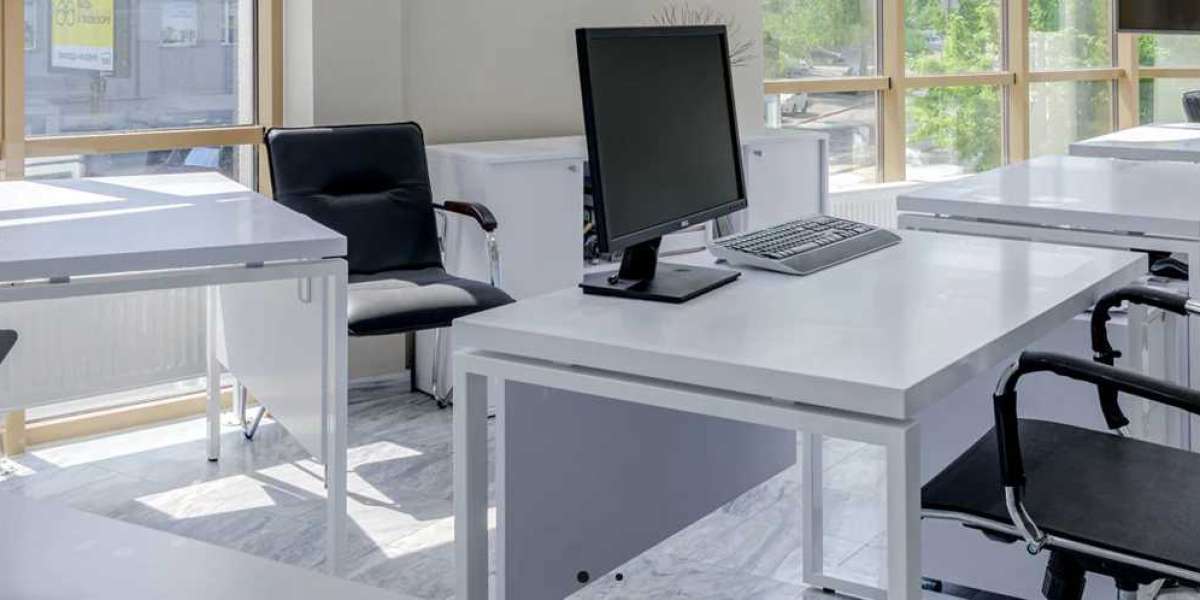Incorporating eco-friendly options into your office design not only helps the environment but can also enhance your company’s reputation and create a healthier workspace. Here are some eco-friendly options for modern offices:
1. Sustainable Office Furniture
- Materials: Choose furniture made from sustainable materials such as reclaimed wood, bamboo, or recycled metal and plastic.
- Certifications: Look for products with certifications like Forest Stewardship Council (FSC) or Cradle to Cradle, which indicate environmentally responsible manufacturing processes.
- Examples:
- Reclaimed Wood Desks: Crafted from salvaged wood to reduce deforestation.
- Bamboo Chairs: Bamboo is a rapidly renewable resource that offers durability and style.
2. Energy-Efficient Lighting
- LED Bulbs: Use LED lighting, which consumes less energy and has a longer lifespan compared to traditional incandescent bulbs.
- Smart Lighting: Implement lighting systems with motion sensors or timers to reduce energy consumption when spaces are not in use.
- Natural Light: Maximize natural light by using large windows, skylights, or light tubes to reduce the need for artificial lighting during the day.
3. Low-VOC Paints and Finishes
- Low-VOC Products: Opt for paints, finishes, and adhesives with low volatile organic compounds (VOCs) to improve indoor air quality.
- Eco-Friendly Paints: Look for products with certifications from organizations like Green Seal or the Environmental Protection Agency (EPA).
4. Recycled and Upcycled Materials
- Recycled Office Supplies: Use recycled paper, office supplies, and packaging materials to minimize waste.
- Upcycled Furniture: Incorporate furniture made from upcycled materials, such as fabric made from recycled plastic bottles or metal pieces repurposed into new designs.
5. Green Building Certifications
- LEED Certification: Consider offices with LEED (Leadership in Energy and Environmental Design) certification, which indicates that the building meets high standards for energy efficiency and environmental impact.
- BREEAM Certification: Look for buildings with BREEAM (Building Research Establishment Environmental Assessment Method) certification for additional environmental performance indicators.
6. Eco-Friendly Office Supplies
- Biodegradable Products: Use biodegradable or compostable office supplies, such as pens, notebooks, and disposable utensils.
- Digital Documentation: Reduce paper waste by digitizing documents and using electronic communication and storage solutions.
7. Green Office Equipment
- Energy Star Appliances: Choose office equipment, such as printers, copiers, and computers, that are Energy Star certified to ensure energy efficiency.
- Eco-Friendly Toner and Ink: Opt for remanufactured or recyclable toner cartridges and eco-friendly inks.
8. Sustainable Flooring Options
- Recycled Flooring: Use flooring materials made from recycled content, such as recycled rubber or glass tiles.
- Sustainable Wood: Choose sustainably sourced wood or bamboo flooring for a stylish and eco-friendly option.
9. Indoor Plants
- Air Purifying Plants: Incorporate indoor plants that improve air quality and create a more pleasant work environment.
- Low Maintenance: Choose plants that are easy to care for and thrive in indoor office conditions.
10. Waste Reduction Programs
- Recycling Stations: Set up recycling stations throughout the office for paper, plastics, and other recyclable materials.
- Composting: Implement a composting program for organic waste, such as food scraps and biodegradable materials.
11. Green Cleaning Products
- Eco-Friendly Cleaners: Use cleaning products that are biodegradable, non-toxic, and free from harsh chemicals.
- Microfiber Cloths: Opt for microfiber cleaning cloths to reduce the need for chemical cleaners and increase cleaning efficiency.
12. Renewable Energy Sources
- Solar Panels: If feasible, invest in solar panels to generate renewable energy for your office.
- Green Energy Providers: Choose energy providers that offer renewable energy options, such as wind or solar power.
13. Eco-Friendly Office Furniture Design
- Modular Furniture: Choose modular furniture that can be easily reconfigured or repurposed to adapt to changing needs and reduce waste.
- Durability: Invest in high-quality, durable furniture that has a longer lifespan, reducing the need for frequent replacements.
14. Water Conservation
- Water-Efficient Fixtures: Install low-flow faucets and toilets to reduce water usage.
- Water Coolers: Use water coolers with refillable bottles or water filtration systems to minimize single-use plastic waste.
Conclusion
Incorporating eco-friendly options into your office design can lead to a healthier work environment, reduce your company’s carbon footprint, and contribute to sustainability efforts. By selecting sustainable materials, energy-efficient products, and waste reduction practices, you can create a modern office that reflects your commitment to environmental responsibility while promoting employee well-being.








